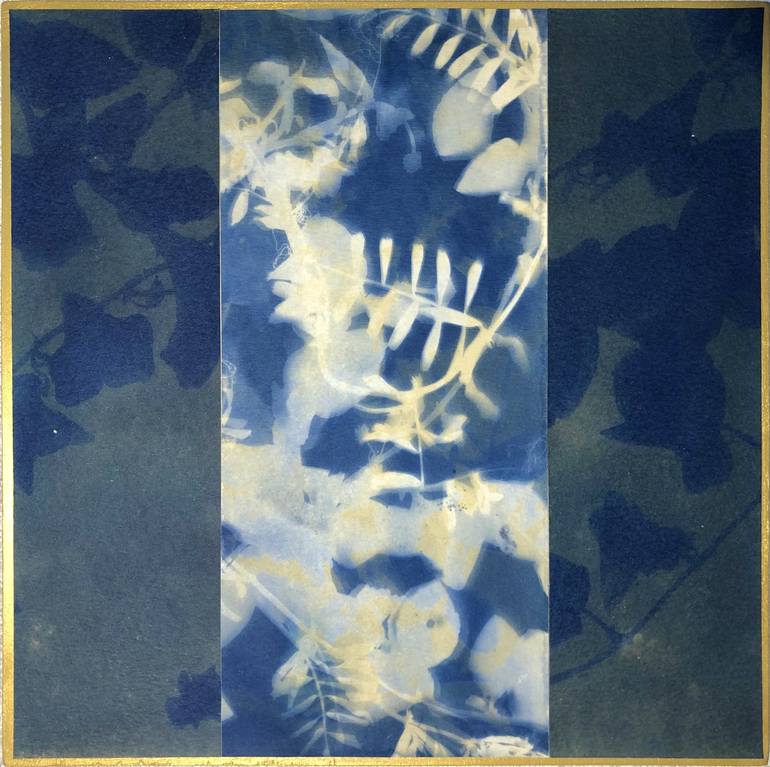







VIEW IN MY ROOM
A Walk in the Green Woods 6 (Collage on panel) Collage
United States
Collage, Paper on Wood
Size: 10 W x 10 H x 0.8 D in
Ships in a Box
Shipping included
14-day satisfaction guarantee
Artist Recognition

Showed at the The Other Art Fair

Artist featured in a collection
About The Artwork
This collage is composed of two different multiple-layered cyanotype prints. The unusual green tone is the result of two cyanotypes (sunprints or blueprints), created one on top of the other. The underlayer was a blueprint that I had “toned” (bleached) yellow and white. The top “layer” or new round of chemicals and light exposure turned what had been white to blue and turned what had been yellow to green. Blue over yellow combined to make shades of green, blue and yellow. While Cyanotypes are technically a form of 19th century photography, I use the process more as printmaking. After a beautiful morning hike in the green woods near my house, I came home and joined these two prints of vines from months ago into one image mounted on on a wood panel. The 3/4 inch deep sides are painted the same gold as the thin 1/8 inch border on the face. There is no need to frame this compact work.
Details & Dimensions
Collage:Paper on Wood
Original:One-of-a-kind Artwork
Size:10 W x 10 H x 0.8 D in
Frame:Not Framed
Ready to Hang:Not applicable
Packaging:Ships in a Box
Shipping & Returns
Delivery Time:Typically 5-7 business days for domestic shipments, 10-14 business days for international shipments.
Handling:Ships in a box. Artists are responsible for packaging and adhering to Saatchi Art’s packaging guidelines.
Ships From:United States.
Have additional questions?
Please visit our help section or contact us.
United States
Clients include: Timothée Chalamet, Starbucks, Mayo Clinic (Jacksonville), Jumaira Resort, Lux Habitat Sotheby’s International (Dubai), Wyndham Worldmark Hotels, Kimpton Hotel Monaco (Salt Lake City) , Mazars Accounting, Limelight Hotel Mammoth (California), MD Anderson Hospital (Houston), Oncology Center, Houston Methodist Hospital. For a complete list of my corporate clients, visit the "About" page of my website www.christineso.gallery/ To see videos of my artistic process, visit me on instagram at @christinesogallery I live in the woods in northern California looking out across the San Francisco Bay towards the hills of Marin, San Francisco and Angel Island. The distant blue hills of my “Faraway Hills” series are ever-present fixtures in my real life. Down below is the bay and above is an endless web of tree branches. Their silhouettes have etched themselves into my memory. My paintings and prints are always nature-inspired and nearly always monochromatic. Having spent a decade as a printmaker making woodcuts, linocuts, etchings, aquatints and monotypes, my mind works in monochrome. I focus on a single color, composition, positive and negative space, pattern, lines and shape. I currently work in two mediums, acrylic painting and cyanotypes, a form of camera-less photography. Cyanotypes are a 19th century form of lensless photography also known as photograms, blueprints and sun prints. They resemble block prints or etchings but use no ink nor printing press. Light “etches” the image on paper I had painted with light-sensitive chemicals. MY NEWEST SERIES OF ABSTRACT CYANOTYPES: My technique is a form of experimental photography, much like the action painters Morris Louis, who poured his veil paintings, or Jackson Pollock who dripped and drizzled his. My abstract cyanotypes are luminous like watercolor paintings but are actually photographs. Each is a multiple-exposure lensless photograph make through deliberate movements of the light-sensitive paper during exposure to light. Different sections of the paper were exposed to light for a longer or shorter time, yielding multiple shades of blue. Each abstract cyanotype is entirely unique. These same lines, shapes and shades of blue cannot be recreated as the exposure of the paper was heavily manipulated by me during each printing. A traditional single-exposure cyanotype yields a white silhouette against a dark blue background.
Artist Recognition

Handpicked to show at The Other Art Fair presented by Saatchi Art in Los Angeles

Artist featured by Saatchi Art in a collection
Thousands Of Five-Star Reviews
We deliver world-class customer service to all of our art buyers.
Global Selection
Explore an unparalleled artwork selection by artists from around the world.
Satisfaction Guaranteed
Our 14-day satisfaction guarantee allows you to buy with confidence.
Support An Artist With Every Purchase
We pay our artists more on every sale than other galleries.
Need More Help?